Consolidated Portfolio for Project Management Methodologies PPMP20009
VerifiedAdded on 2023/06/11
|15
|4153
|82
Portfolio
AI Summary
This portfolio provides a consolidated view of project management methodologies, addressing key learning outcomes such as explaining the reasons organizations adopt these methodologies, critically analyzing their impact on stakeholders, and justifying the major elements of a methodology that meets organizational needs. It includes discussions on project administration, the importance of aligning projects with business goals, and managing stakeholders effectively. The portfolio also details the five basic stages of project management: initiation, planning, execution, monitoring and controlling, and closure, with examples from the chemical industry. References to academic sources support the analysis and conclusions presented.
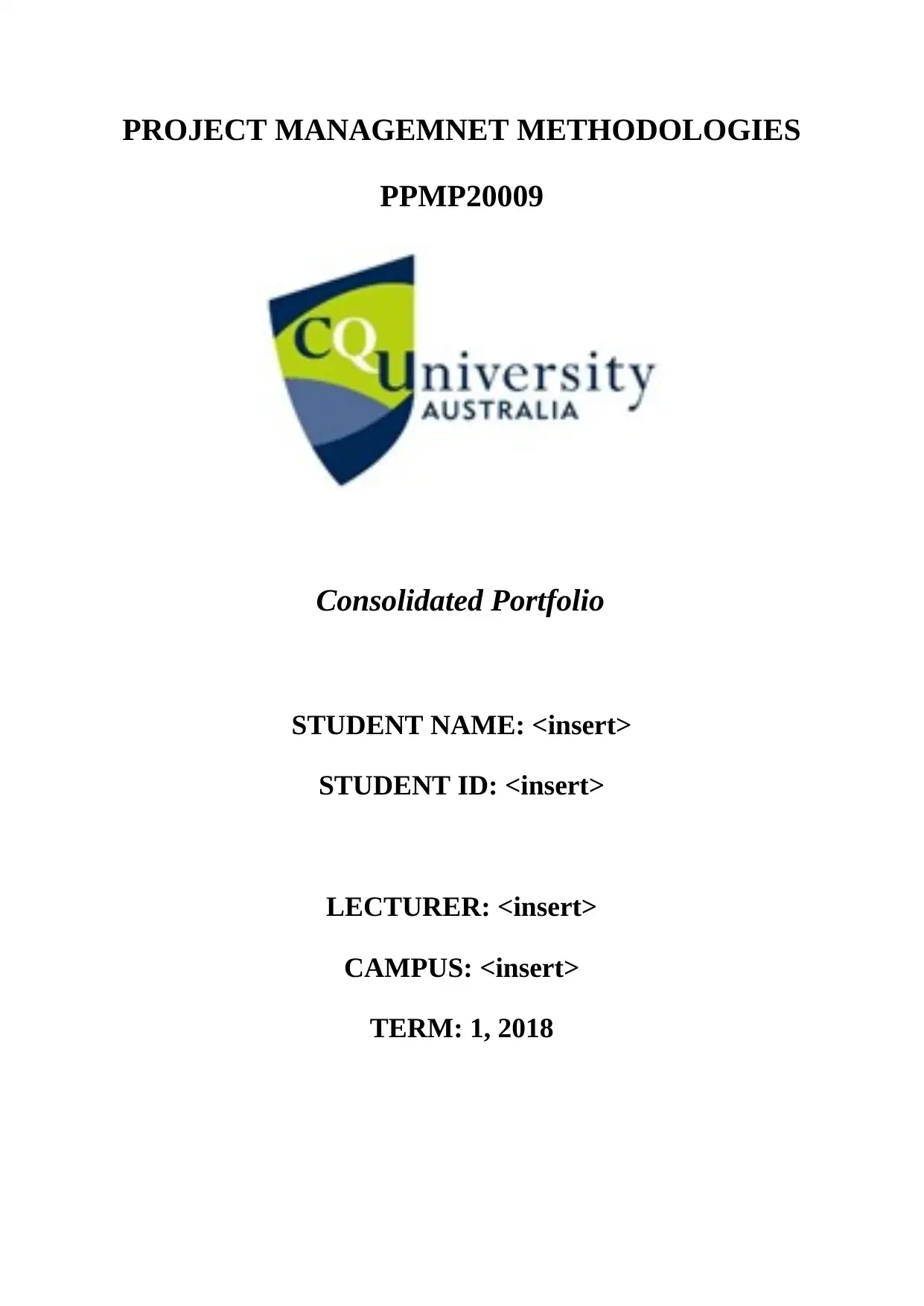
PROJECT MANAGEMNET METHODOLOGIES
PPMP20009
Consolidated Portfolio
STUDENT NAME: <insert>
STUDENT ID: <insert>
LECTURER: <insert>
CAMPUS: <insert>
TERM: 1, 2018
PPMP20009
Consolidated Portfolio
STUDENT NAME: <insert>
STUDENT ID: <insert>
LECTURER: <insert>
CAMPUS: <insert>
TERM: 1, 2018
Paraphrase This Document
Need a fresh take? Get an instant paraphrase of this document with our AI Paraphraser
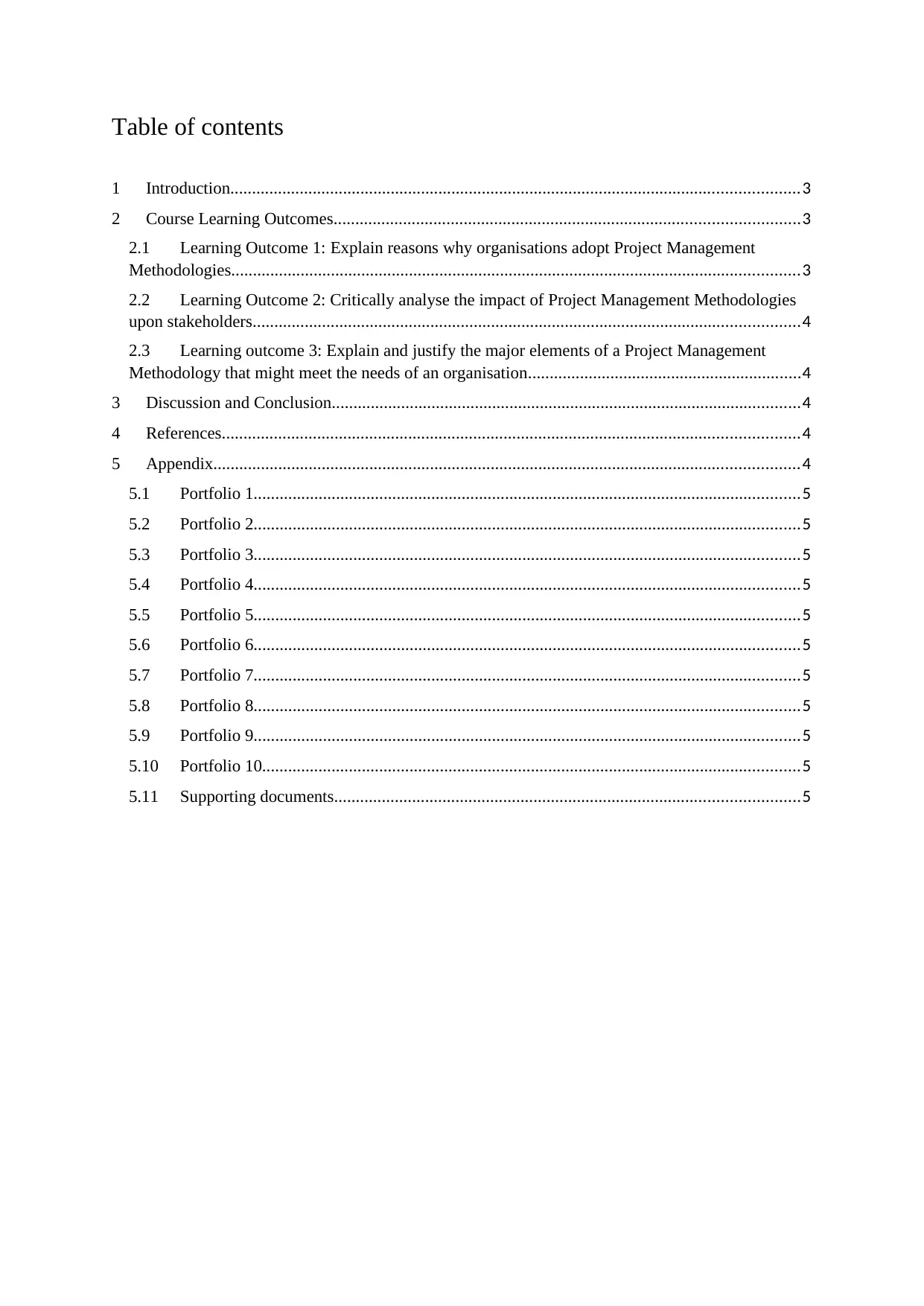
Table of contents
1 Introduction...................................................................................................................................3
2 Course Learning Outcomes...........................................................................................................3
2.1 Learning Outcome 1: Explain reasons why organisations adopt Project Management
Methodologies...................................................................................................................................3
2.2 Learning Outcome 2: Critically analyse the impact of Project Management Methodologies
upon stakeholders..............................................................................................................................4
2.3 Learning outcome 3: Explain and justify the major elements of a Project Management
Methodology that might meet the needs of an organisation...............................................................4
3 Discussion and Conclusion............................................................................................................4
4 References.....................................................................................................................................4
5 Appendix.......................................................................................................................................4
5.1 Portfolio 1..............................................................................................................................5
5.2 Portfolio 2..............................................................................................................................5
5.3 Portfolio 3..............................................................................................................................5
5.4 Portfolio 4..............................................................................................................................5
5.5 Portfolio 5..............................................................................................................................5
5.6 Portfolio 6..............................................................................................................................5
5.7 Portfolio 7..............................................................................................................................5
5.8 Portfolio 8..............................................................................................................................5
5.9 Portfolio 9..............................................................................................................................5
5.10 Portfolio 10............................................................................................................................5
5.11 Supporting documents...........................................................................................................5
1 Introduction...................................................................................................................................3
2 Course Learning Outcomes...........................................................................................................3
2.1 Learning Outcome 1: Explain reasons why organisations adopt Project Management
Methodologies...................................................................................................................................3
2.2 Learning Outcome 2: Critically analyse the impact of Project Management Methodologies
upon stakeholders..............................................................................................................................4
2.3 Learning outcome 3: Explain and justify the major elements of a Project Management
Methodology that might meet the needs of an organisation...............................................................4
3 Discussion and Conclusion............................................................................................................4
4 References.....................................................................................................................................4
5 Appendix.......................................................................................................................................4
5.1 Portfolio 1..............................................................................................................................5
5.2 Portfolio 2..............................................................................................................................5
5.3 Portfolio 3..............................................................................................................................5
5.4 Portfolio 4..............................................................................................................................5
5.5 Portfolio 5..............................................................................................................................5
5.6 Portfolio 6..............................................................................................................................5
5.7 Portfolio 7..............................................................................................................................5
5.8 Portfolio 8..............................................................................................................................5
5.9 Portfolio 9..............................................................................................................................5
5.10 Portfolio 10............................................................................................................................5
5.11 Supporting documents...........................................................................................................5
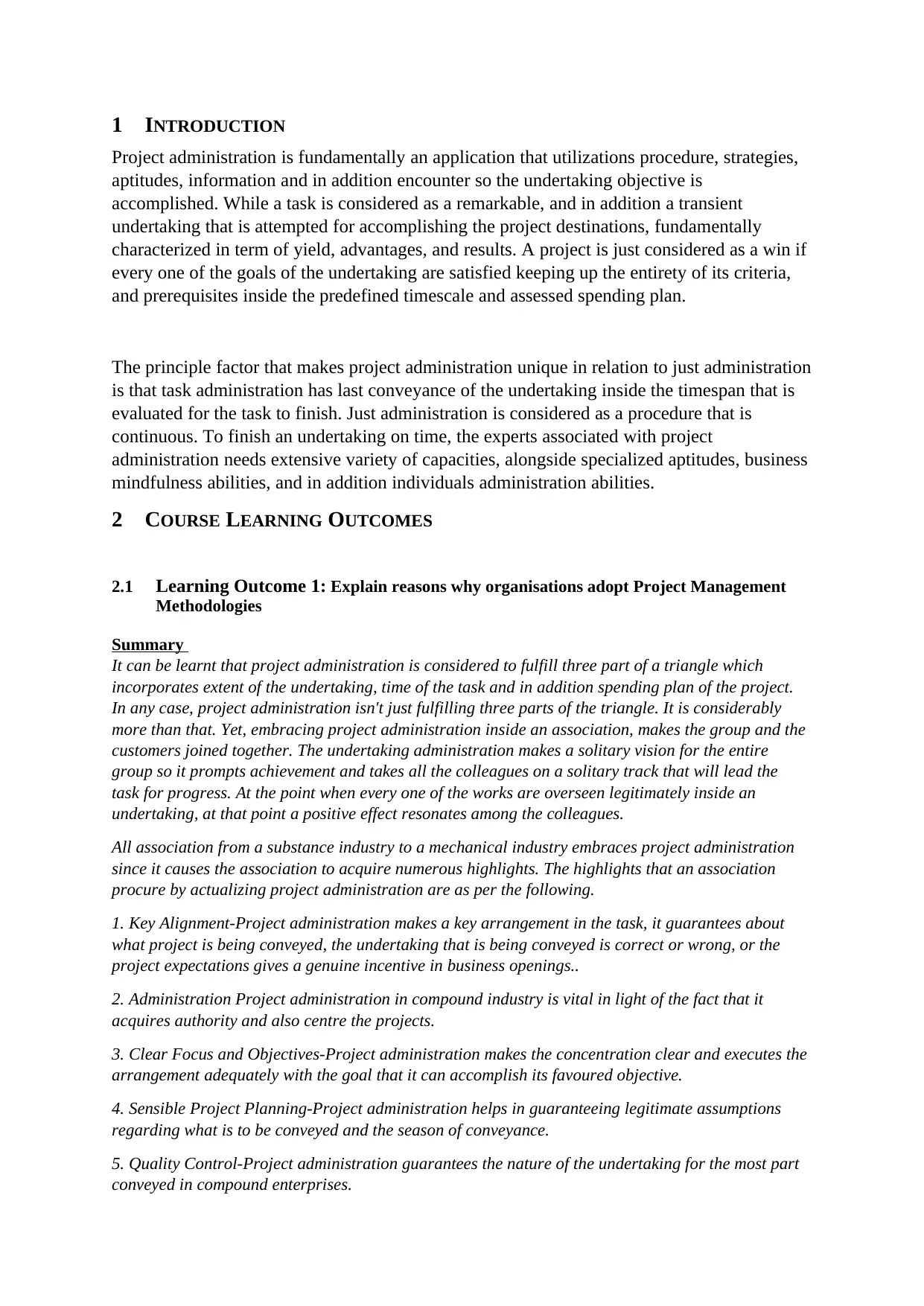
1 INTRODUCTION
Project administration is fundamentally an application that utilizations procedure, strategies,
aptitudes, information and in addition encounter so the undertaking objective is
accomplished. While a task is considered as a remarkable, and in addition a transient
undertaking that is attempted for accomplishing the project destinations, fundamentally
characterized in term of yield, advantages, and results. A project is just considered as a win if
every one of the goals of the undertaking are satisfied keeping up the entirety of its criteria,
and prerequisites inside the predefined timescale and assessed spending plan.
The principle factor that makes project administration unique in relation to just administration
is that task administration has last conveyance of the undertaking inside the timespan that is
evaluated for the task to finish. Just administration is considered as a procedure that is
continuous. To finish an undertaking on time, the experts associated with project
administration needs extensive variety of capacities, alongside specialized aptitudes, business
mindfulness abilities, and in addition individuals administration abilities.
2 COURSE LEARNING OUTCOMES
2.1 Learning Outcome 1: Explain reasons why organisations adopt Project Management
Methodologies
Summary
It can be learnt that project administration is considered to fulfill three part of a triangle which
incorporates extent of the undertaking, time of the task and in addition spending plan of the project.
In any case, project administration isn't just fulfilling three parts of the triangle. It is considerably
more than that. Yet, embracing project administration inside an association, makes the group and the
customers joined together. The undertaking administration makes a solitary vision for the entire
group so it prompts achievement and takes all the colleagues on a solitary track that will lead the
task for progress. At the point when every one of the works are overseen legitimately inside an
undertaking, at that point a positive effect resonates among the colleagues.
All association from a substance industry to a mechanical industry embraces project administration
since it causes the association to acquire numerous highlights. The highlights that an association
procure by actualizing project administration are as per the following.
1. Key Alignment-Project administration makes a key arrangement in the task, it guarantees about
what project is being conveyed, the undertaking that is being conveyed is correct or wrong, or the
project expectations gives a genuine incentive in business openings..
2. Administration Project administration in compound industry is vital in light of the fact that it
acquires authority and also centre the projects.
3. Clear Focus and Objectives-Project administration makes the concentration clear and executes the
arrangement adequately with the goal that it can accomplish its favoured objective.
4. Sensible Project Planning-Project administration helps in guaranteeing legitimate assumptions
regarding what is to be conveyed and the season of conveyance.
5. Quality Control-Project administration guarantees the nature of the undertaking for the most part
conveyed in compound enterprises.
Project administration is fundamentally an application that utilizations procedure, strategies,
aptitudes, information and in addition encounter so the undertaking objective is
accomplished. While a task is considered as a remarkable, and in addition a transient
undertaking that is attempted for accomplishing the project destinations, fundamentally
characterized in term of yield, advantages, and results. A project is just considered as a win if
every one of the goals of the undertaking are satisfied keeping up the entirety of its criteria,
and prerequisites inside the predefined timescale and assessed spending plan.
The principle factor that makes project administration unique in relation to just administration
is that task administration has last conveyance of the undertaking inside the timespan that is
evaluated for the task to finish. Just administration is considered as a procedure that is
continuous. To finish an undertaking on time, the experts associated with project
administration needs extensive variety of capacities, alongside specialized aptitudes, business
mindfulness abilities, and in addition individuals administration abilities.
2 COURSE LEARNING OUTCOMES
2.1 Learning Outcome 1: Explain reasons why organisations adopt Project Management
Methodologies
Summary
It can be learnt that project administration is considered to fulfill three part of a triangle which
incorporates extent of the undertaking, time of the task and in addition spending plan of the project.
In any case, project administration isn't just fulfilling three parts of the triangle. It is considerably
more than that. Yet, embracing project administration inside an association, makes the group and the
customers joined together. The undertaking administration makes a solitary vision for the entire
group so it prompts achievement and takes all the colleagues on a solitary track that will lead the
task for progress. At the point when every one of the works are overseen legitimately inside an
undertaking, at that point a positive effect resonates among the colleagues.
All association from a substance industry to a mechanical industry embraces project administration
since it causes the association to acquire numerous highlights. The highlights that an association
procure by actualizing project administration are as per the following.
1. Key Alignment-Project administration makes a key arrangement in the task, it guarantees about
what project is being conveyed, the undertaking that is being conveyed is correct or wrong, or the
project expectations gives a genuine incentive in business openings..
2. Administration Project administration in compound industry is vital in light of the fact that it
acquires authority and also centre the projects.
3. Clear Focus and Objectives-Project administration makes the concentration clear and executes the
arrangement adequately with the goal that it can accomplish its favoured objective.
4. Sensible Project Planning-Project administration helps in guaranteeing legitimate assumptions
regarding what is to be conveyed and the season of conveyance.
5. Quality Control-Project administration guarantees the nature of the undertaking for the most part
conveyed in compound enterprises.
⊘ This is a preview!⊘
Do you want full access?
Subscribe today to unlock all pages.

Trusted by 1+ million students worldwide
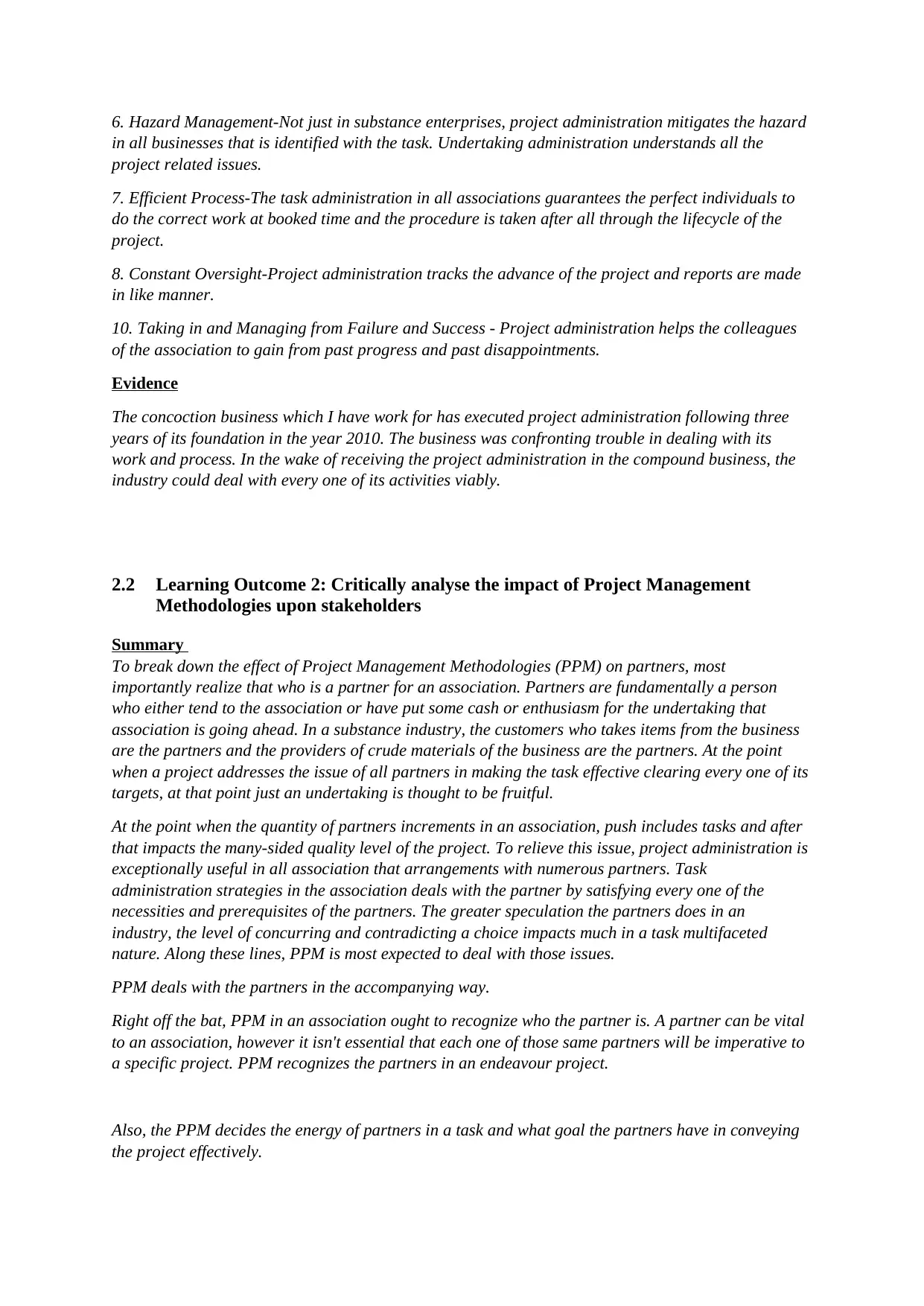
6. Hazard Management-Not just in substance enterprises, project administration mitigates the hazard
in all businesses that is identified with the task. Undertaking administration understands all the
project related issues.
7. Efficient Process-The task administration in all associations guarantees the perfect individuals to
do the correct work at booked time and the procedure is taken after all through the lifecycle of the
project.
8. Constant Oversight-Project administration tracks the advance of the project and reports are made
in like manner.
10. Taking in and Managing from Failure and Success - Project administration helps the colleagues
of the association to gain from past progress and past disappointments.
Evidence
The concoction business which I have work for has executed project administration following three
years of its foundation in the year 2010. The business was confronting trouble in dealing with its
work and process. In the wake of receiving the project administration in the compound business, the
industry could deal with every one of its activities viably.
2.2 Learning Outcome 2: Critically analyse the impact of Project Management
Methodologies upon stakeholders
Summary
To break down the effect of Project Management Methodologies (PPM) on partners, most
importantly realize that who is a partner for an association. Partners are fundamentally a person
who either tend to the association or have put some cash or enthusiasm for the undertaking that
association is going ahead. In a substance industry, the customers who takes items from the business
are the partners and the providers of crude materials of the business are the partners. At the point
when a project addresses the issue of all partners in making the task effective clearing every one of its
targets, at that point just an undertaking is thought to be fruitful.
At the point when the quantity of partners increments in an association, push includes tasks and after
that impacts the many-sided quality level of the project. To relieve this issue, project administration is
exceptionally useful in all association that arrangements with numerous partners. Task
administration strategies in the association deals with the partner by satisfying every one of the
necessities and prerequisites of the partners. The greater speculation the partners does in an
industry, the level of concurring and contradicting a choice impacts much in a task multifaceted
nature. Along these lines, PPM is most expected to deal with those issues.
PPM deals with the partners in the accompanying way.
Right off the bat, PPM in an association ought to recognize who the partner is. A partner can be vital
to an association, however it isn't essential that each one of those same partners will be imperative to
a specific project. PPM recognizes the partners in an endeavour project.
Also, the PPM decides the energy of partners in a task and what goal the partners have in conveying
the project effectively.
in all businesses that is identified with the task. Undertaking administration understands all the
project related issues.
7. Efficient Process-The task administration in all associations guarantees the perfect individuals to
do the correct work at booked time and the procedure is taken after all through the lifecycle of the
project.
8. Constant Oversight-Project administration tracks the advance of the project and reports are made
in like manner.
10. Taking in and Managing from Failure and Success - Project administration helps the colleagues
of the association to gain from past progress and past disappointments.
Evidence
The concoction business which I have work for has executed project administration following three
years of its foundation in the year 2010. The business was confronting trouble in dealing with its
work and process. In the wake of receiving the project administration in the compound business, the
industry could deal with every one of its activities viably.
2.2 Learning Outcome 2: Critically analyse the impact of Project Management
Methodologies upon stakeholders
Summary
To break down the effect of Project Management Methodologies (PPM) on partners, most
importantly realize that who is a partner for an association. Partners are fundamentally a person
who either tend to the association or have put some cash or enthusiasm for the undertaking that
association is going ahead. In a substance industry, the customers who takes items from the business
are the partners and the providers of crude materials of the business are the partners. At the point
when a project addresses the issue of all partners in making the task effective clearing every one of its
targets, at that point just an undertaking is thought to be fruitful.
At the point when the quantity of partners increments in an association, push includes tasks and after
that impacts the many-sided quality level of the project. To relieve this issue, project administration is
exceptionally useful in all association that arrangements with numerous partners. Task
administration strategies in the association deals with the partner by satisfying every one of the
necessities and prerequisites of the partners. The greater speculation the partners does in an
industry, the level of concurring and contradicting a choice impacts much in a task multifaceted
nature. Along these lines, PPM is most expected to deal with those issues.
PPM deals with the partners in the accompanying way.
Right off the bat, PPM in an association ought to recognize who the partner is. A partner can be vital
to an association, however it isn't essential that each one of those same partners will be imperative to
a specific project. PPM recognizes the partners in an endeavour project.
Also, the PPM decides the energy of partners in a task and what goal the partners have in conveying
the project effectively.
Paraphrase This Document
Need a fresh take? Get an instant paraphrase of this document with our AI Paraphraser
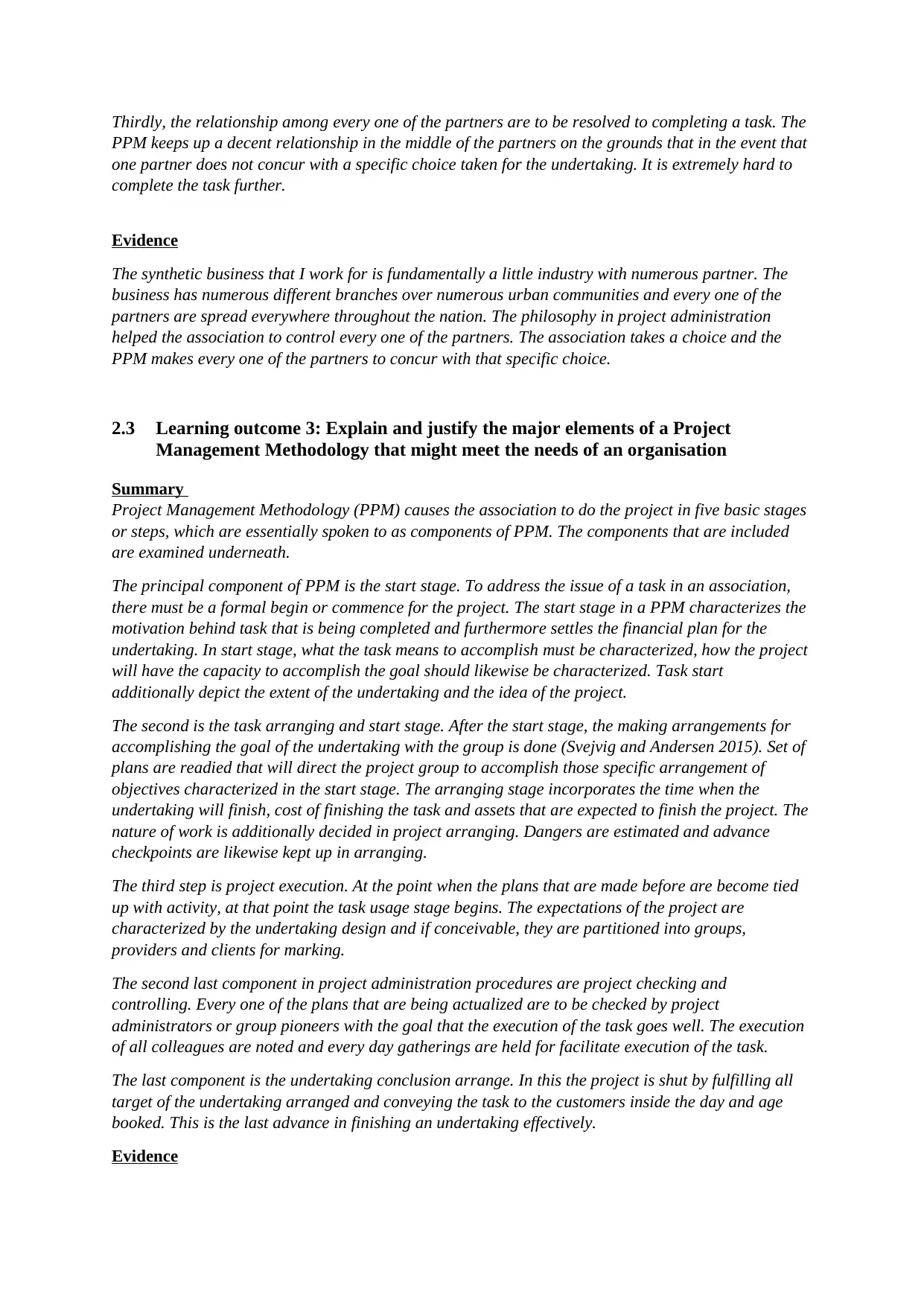
Thirdly, the relationship among every one of the partners are to be resolved to completing a task. The
PPM keeps up a decent relationship in the middle of the partners on the grounds that in the event that
one partner does not concur with a specific choice taken for the undertaking. It is extremely hard to
complete the task further.
Evidence
The synthetic business that I work for is fundamentally a little industry with numerous partner. The
business has numerous different branches over numerous urban communities and every one of the
partners are spread everywhere throughout the nation. The philosophy in project administration
helped the association to control every one of the partners. The association takes a choice and the
PPM makes every one of the partners to concur with that specific choice.
2.3 Learning outcome 3: Explain and justify the major elements of a Project
Management Methodology that might meet the needs of an organisation
Summary
Project Management Methodology (PPM) causes the association to do the project in five basic stages
or steps, which are essentially spoken to as components of PPM. The components that are included
are examined underneath.
The principal component of PPM is the start stage. To address the issue of a task in an association,
there must be a formal begin or commence for the project. The start stage in a PPM characterizes the
motivation behind task that is being completed and furthermore settles the financial plan for the
undertaking. In start stage, what the task means to accomplish must be characterized, how the project
will have the capacity to accomplish the goal should likewise be characterized. Task start
additionally depict the extent of the undertaking and the idea of the project.
The second is the task arranging and start stage. After the start stage, the making arrangements for
accomplishing the goal of the undertaking with the group is done (Svejvig and Andersen 2015). Set of
plans are readied that will direct the project group to accomplish those specific arrangement of
objectives characterized in the start stage. The arranging stage incorporates the time when the
undertaking will finish, cost of finishing the task and assets that are expected to finish the project. The
nature of work is additionally decided in project arranging. Dangers are estimated and advance
checkpoints are likewise kept up in arranging.
The third step is project execution. At the point when the plans that are made before are become tied
up with activity, at that point the task usage stage begins. The expectations of the project are
characterized by the undertaking design and if conceivable, they are partitioned into groups,
providers and clients for marking.
The second last component in project administration procedures are project checking and
controlling. Every one of the plans that are being actualized are to be checked by project
administrators or group pioneers with the goal that the execution of the task goes well. The execution
of all colleagues are noted and every day gatherings are held for facilitate execution of the task.
The last component is the undertaking conclusion arrange. In this the project is shut by fulfilling all
target of the undertaking arranged and conveying the task to the customers inside the day and age
booked. This is the last advance in finishing an undertaking effectively.
Evidence
PPM keeps up a decent relationship in the middle of the partners on the grounds that in the event that
one partner does not concur with a specific choice taken for the undertaking. It is extremely hard to
complete the task further.
Evidence
The synthetic business that I work for is fundamentally a little industry with numerous partner. The
business has numerous different branches over numerous urban communities and every one of the
partners are spread everywhere throughout the nation. The philosophy in project administration
helped the association to control every one of the partners. The association takes a choice and the
PPM makes every one of the partners to concur with that specific choice.
2.3 Learning outcome 3: Explain and justify the major elements of a Project
Management Methodology that might meet the needs of an organisation
Summary
Project Management Methodology (PPM) causes the association to do the project in five basic stages
or steps, which are essentially spoken to as components of PPM. The components that are included
are examined underneath.
The principal component of PPM is the start stage. To address the issue of a task in an association,
there must be a formal begin or commence for the project. The start stage in a PPM characterizes the
motivation behind task that is being completed and furthermore settles the financial plan for the
undertaking. In start stage, what the task means to accomplish must be characterized, how the project
will have the capacity to accomplish the goal should likewise be characterized. Task start
additionally depict the extent of the undertaking and the idea of the project.
The second is the task arranging and start stage. After the start stage, the making arrangements for
accomplishing the goal of the undertaking with the group is done (Svejvig and Andersen 2015). Set of
plans are readied that will direct the project group to accomplish those specific arrangement of
objectives characterized in the start stage. The arranging stage incorporates the time when the
undertaking will finish, cost of finishing the task and assets that are expected to finish the project. The
nature of work is additionally decided in project arranging. Dangers are estimated and advance
checkpoints are likewise kept up in arranging.
The third step is project execution. At the point when the plans that are made before are become tied
up with activity, at that point the task usage stage begins. The expectations of the project are
characterized by the undertaking design and if conceivable, they are partitioned into groups,
providers and clients for marking.
The second last component in project administration procedures are project checking and
controlling. Every one of the plans that are being actualized are to be checked by project
administrators or group pioneers with the goal that the execution of the task goes well. The execution
of all colleagues are noted and every day gatherings are held for facilitate execution of the task.
The last component is the undertaking conclusion arrange. In this the project is shut by fulfilling all
target of the undertaking arranged and conveying the task to the customers inside the day and age
booked. This is the last advance in finishing an undertaking effectively.
Evidence
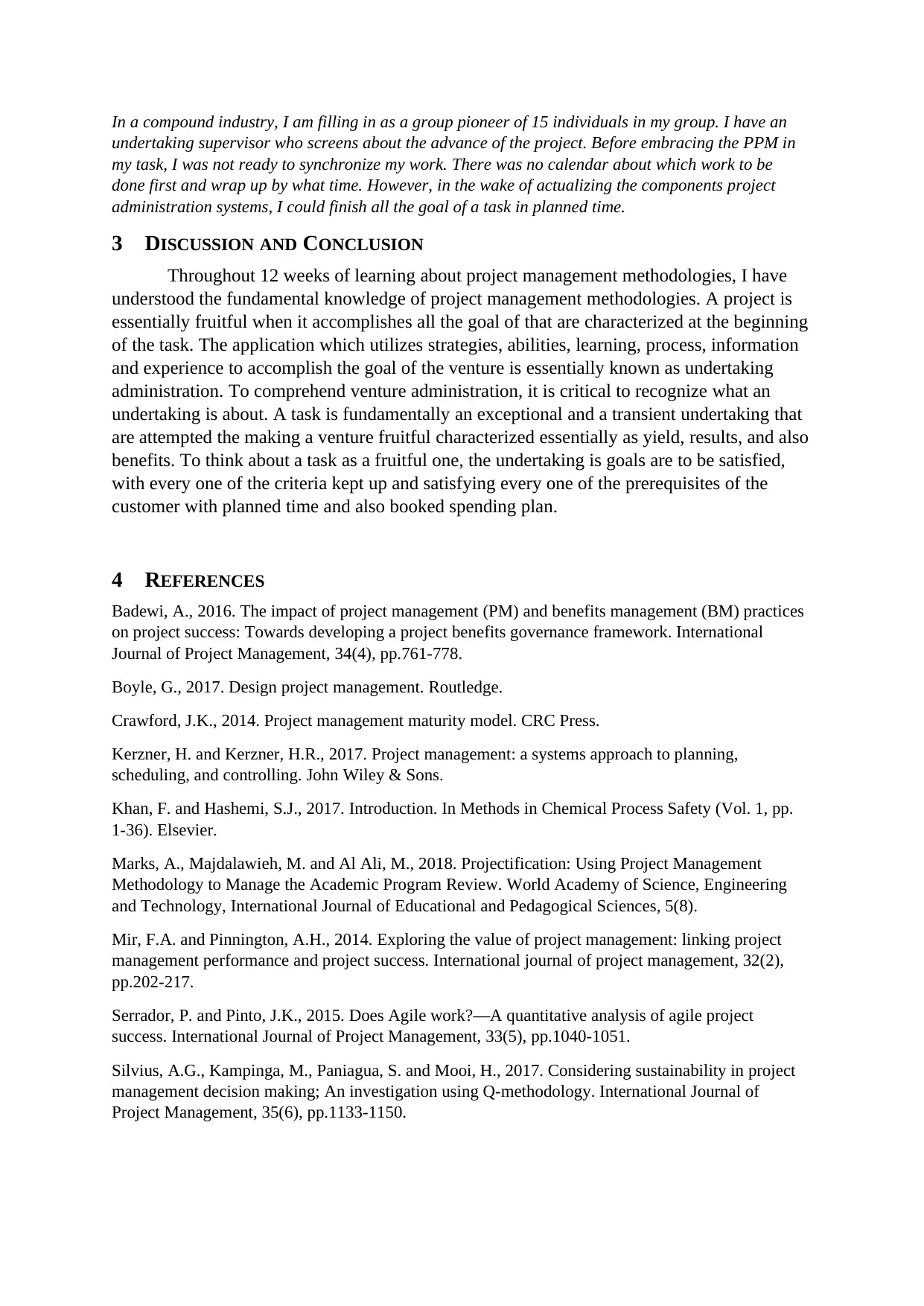
In a compound industry, I am filling in as a group pioneer of 15 individuals in my group. I have an
undertaking supervisor who screens about the advance of the project. Before embracing the PPM in
my task, I was not ready to synchronize my work. There was no calendar about which work to be
done first and wrap up by what time. However, in the wake of actualizing the components project
administration systems, I could finish all the goal of a task in planned time.
3 DISCUSSION AND CONCLUSION
Throughout 12 weeks of learning about project management methodologies, I have
understood the fundamental knowledge of project management methodologies. A project is
essentially fruitful when it accomplishes all the goal of that are characterized at the beginning
of the task. The application which utilizes strategies, abilities, learning, process, information
and experience to accomplish the goal of the venture is essentially known as undertaking
administration. To comprehend venture administration, it is critical to recognize what an
undertaking is about. A task is fundamentally an exceptional and a transient undertaking that
are attempted the making a venture fruitful characterized essentially as yield, results, and also
benefits. To think about a task as a fruitful one, the undertaking is goals are to be satisfied,
with every one of the criteria kept up and satisfying every one of the prerequisites of the
customer with planned time and also booked spending plan.
4 REFERENCES
Badewi, A., 2016. The impact of project management (PM) and benefits management (BM) practices
on project success: Towards developing a project benefits governance framework. International
Journal of Project Management, 34(4), pp.761-778.
Boyle, G., 2017. Design project management. Routledge.
Crawford, J.K., 2014. Project management maturity model. CRC Press.
Kerzner, H. and Kerzner, H.R., 2017. Project management: a systems approach to planning,
scheduling, and controlling. John Wiley & Sons.
Khan, F. and Hashemi, S.J., 2017. Introduction. In Methods in Chemical Process Safety (Vol. 1, pp.
1-36). Elsevier.
Marks, A., Majdalawieh, M. and Al Ali, M., 2018. Projectification: Using Project Management
Methodology to Manage the Academic Program Review. World Academy of Science, Engineering
and Technology, International Journal of Educational and Pedagogical Sciences, 5(8).
Mir, F.A. and Pinnington, A.H., 2014. Exploring the value of project management: linking project
management performance and project success. International journal of project management, 32(2),
pp.202-217.
Serrador, P. and Pinto, J.K., 2015. Does Agile work?—A quantitative analysis of agile project
success. International Journal of Project Management, 33(5), pp.1040-1051.
Silvius, A.G., Kampinga, M., Paniagua, S. and Mooi, H., 2017. Considering sustainability in project
management decision making; An investigation using Q-methodology. International Journal of
Project Management, 35(6), pp.1133-1150.
undertaking supervisor who screens about the advance of the project. Before embracing the PPM in
my task, I was not ready to synchronize my work. There was no calendar about which work to be
done first and wrap up by what time. However, in the wake of actualizing the components project
administration systems, I could finish all the goal of a task in planned time.
3 DISCUSSION AND CONCLUSION
Throughout 12 weeks of learning about project management methodologies, I have
understood the fundamental knowledge of project management methodologies. A project is
essentially fruitful when it accomplishes all the goal of that are characterized at the beginning
of the task. The application which utilizes strategies, abilities, learning, process, information
and experience to accomplish the goal of the venture is essentially known as undertaking
administration. To comprehend venture administration, it is critical to recognize what an
undertaking is about. A task is fundamentally an exceptional and a transient undertaking that
are attempted the making a venture fruitful characterized essentially as yield, results, and also
benefits. To think about a task as a fruitful one, the undertaking is goals are to be satisfied,
with every one of the criteria kept up and satisfying every one of the prerequisites of the
customer with planned time and also booked spending plan.
4 REFERENCES
Badewi, A., 2016. The impact of project management (PM) and benefits management (BM) practices
on project success: Towards developing a project benefits governance framework. International
Journal of Project Management, 34(4), pp.761-778.
Boyle, G., 2017. Design project management. Routledge.
Crawford, J.K., 2014. Project management maturity model. CRC Press.
Kerzner, H. and Kerzner, H.R., 2017. Project management: a systems approach to planning,
scheduling, and controlling. John Wiley & Sons.
Khan, F. and Hashemi, S.J., 2017. Introduction. In Methods in Chemical Process Safety (Vol. 1, pp.
1-36). Elsevier.
Marks, A., Majdalawieh, M. and Al Ali, M., 2018. Projectification: Using Project Management
Methodology to Manage the Academic Program Review. World Academy of Science, Engineering
and Technology, International Journal of Educational and Pedagogical Sciences, 5(8).
Mir, F.A. and Pinnington, A.H., 2014. Exploring the value of project management: linking project
management performance and project success. International journal of project management, 32(2),
pp.202-217.
Serrador, P. and Pinto, J.K., 2015. Does Agile work?—A quantitative analysis of agile project
success. International Journal of Project Management, 33(5), pp.1040-1051.
Silvius, A.G., Kampinga, M., Paniagua, S. and Mooi, H., 2017. Considering sustainability in project
management decision making; An investigation using Q-methodology. International Journal of
Project Management, 35(6), pp.1133-1150.
⊘ This is a preview!⊘
Do you want full access?
Subscribe today to unlock all pages.

Trusted by 1+ million students worldwide
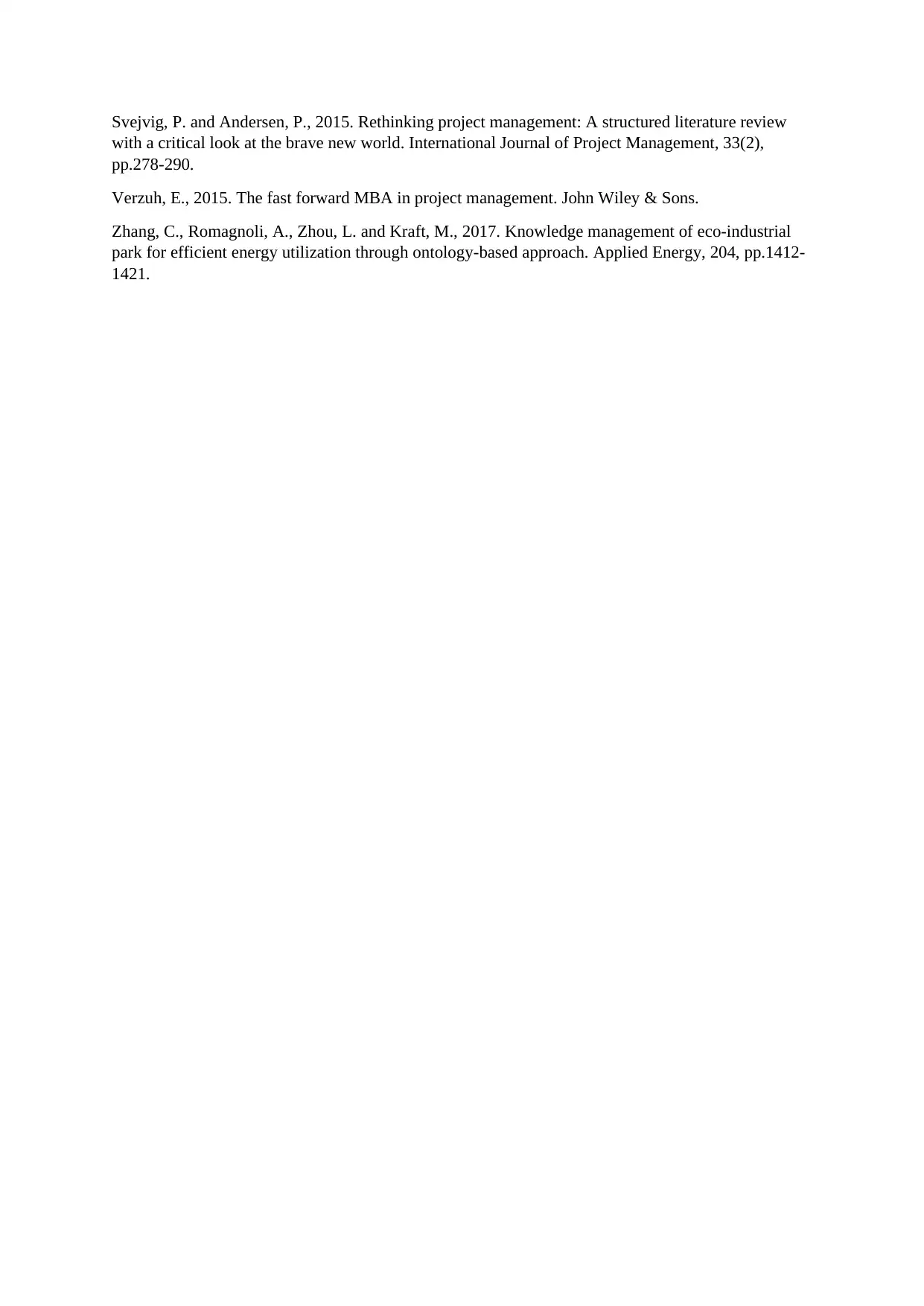
Svejvig, P. and Andersen, P., 2015. Rethinking project management: A structured literature review
with a critical look at the brave new world. International Journal of Project Management, 33(2),
pp.278-290.
Verzuh, E., 2015. The fast forward MBA in project management. John Wiley & Sons.
Zhang, C., Romagnoli, A., Zhou, L. and Kraft, M., 2017. Knowledge management of eco-industrial
park for efficient energy utilization through ontology-based approach. Applied Energy, 204, pp.1412-
1421.
with a critical look at the brave new world. International Journal of Project Management, 33(2),
pp.278-290.
Verzuh, E., 2015. The fast forward MBA in project management. John Wiley & Sons.
Zhang, C., Romagnoli, A., Zhou, L. and Kraft, M., 2017. Knowledge management of eco-industrial
park for efficient energy utilization through ontology-based approach. Applied Energy, 204, pp.1412-
1421.
Paraphrase This Document
Need a fresh take? Get an instant paraphrase of this document with our AI Paraphraser
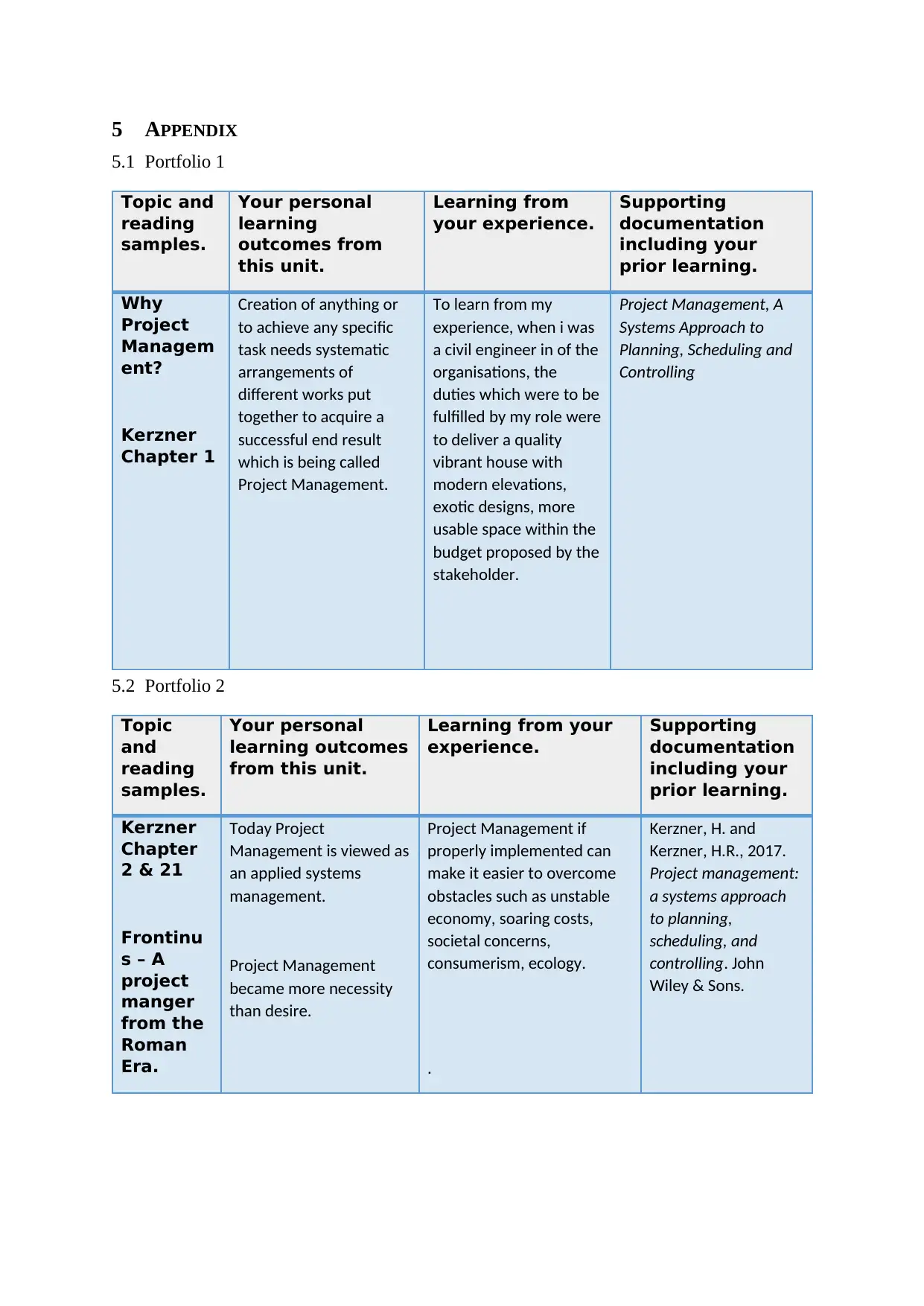
5 APPENDIX
5.1 Portfolio 1
Topic and
reading
samples.
Your personal
learning
outcomes from
this unit.
Learning from
your experience.
Supporting
documentation
including your
prior learning.
Why
Project
Managem
ent?
Kerzner
Chapter 1
Creation of anything or
to achieve any specific
task needs systematic
arrangements of
different works put
together to acquire a
successful end result
which is being called
Project Management.
To learn from my
experience, when i was
a civil engineer in of the
organisations, the
duties which were to be
fulfilled by my role were
to deliver a quality
vibrant house with
modern elevations,
exotic designs, more
usable space within the
budget proposed by the
stakeholder.
Project Management, A
Systems Approach to
Planning, Scheduling and
Controlling
5.2 Portfolio 2
Topic
and
reading
samples.
Your personal
learning outcomes
from this unit.
Learning from your
experience.
Supporting
documentation
including your
prior learning.
Kerzner
Chapter
2 & 21
Frontinu
s – A
project
manger
from the
Roman
Era.
Today Project
Management is viewed as
an applied systems
management.
Project Management
became more necessity
than desire.
Project Management if
properly implemented can
make it easier to overcome
obstacles such as unstable
economy, soaring costs,
societal concerns,
consumerism, ecology.
.
Kerzner, H. and
Kerzner, H.R., 2017.
Project management:
a systems approach
to planning,
scheduling, and
controlling. John
Wiley & Sons.
5.1 Portfolio 1
Topic and
reading
samples.
Your personal
learning
outcomes from
this unit.
Learning from
your experience.
Supporting
documentation
including your
prior learning.
Why
Project
Managem
ent?
Kerzner
Chapter 1
Creation of anything or
to achieve any specific
task needs systematic
arrangements of
different works put
together to acquire a
successful end result
which is being called
Project Management.
To learn from my
experience, when i was
a civil engineer in of the
organisations, the
duties which were to be
fulfilled by my role were
to deliver a quality
vibrant house with
modern elevations,
exotic designs, more
usable space within the
budget proposed by the
stakeholder.
Project Management, A
Systems Approach to
Planning, Scheduling and
Controlling
5.2 Portfolio 2
Topic
and
reading
samples.
Your personal
learning outcomes
from this unit.
Learning from your
experience.
Supporting
documentation
including your
prior learning.
Kerzner
Chapter
2 & 21
Frontinu
s – A
project
manger
from the
Roman
Era.
Today Project
Management is viewed as
an applied systems
management.
Project Management
became more necessity
than desire.
Project Management if
properly implemented can
make it easier to overcome
obstacles such as unstable
economy, soaring costs,
societal concerns,
consumerism, ecology.
.
Kerzner, H. and
Kerzner, H.R., 2017.
Project management:
a systems approach
to planning,
scheduling, and
controlling. John
Wiley & Sons.
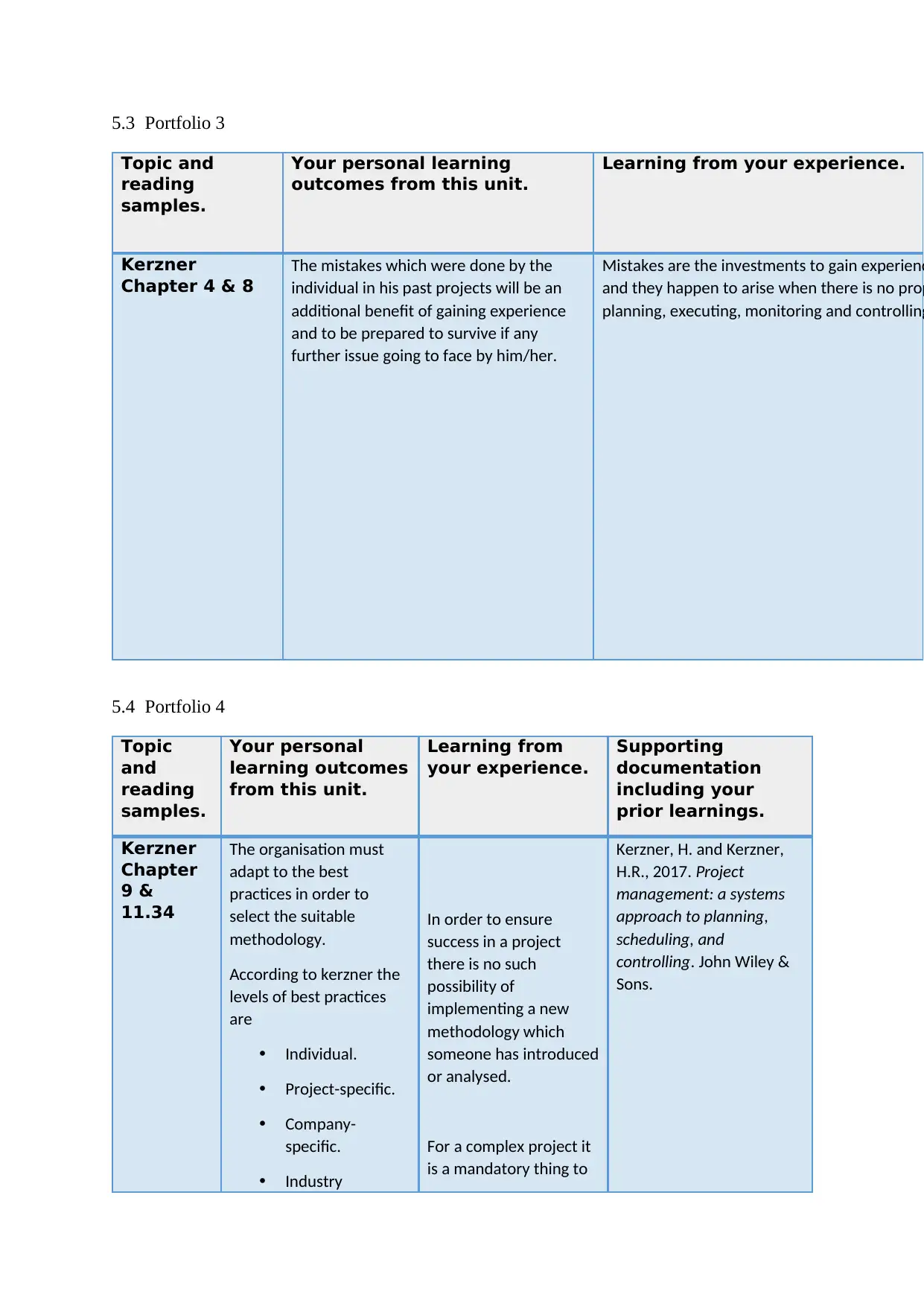
5.3 Portfolio 3
Topic and
reading
samples.
Your personal learning
outcomes from this unit.
Learning from your experience.
Kerzner
Chapter 4 & 8
The mistakes which were done by the
individual in his past projects will be an
additional benefit of gaining experience
and to be prepared to survive if any
further issue going to face by him/her.
Mistakes are the investments to gain experienc
and they happen to arise when there is no prop
planning, executing, monitoring and controlling
5.4 Portfolio 4
Topic
and
reading
samples.
Your personal
learning outcomes
from this unit.
Learning from
your experience.
Supporting
documentation
including your
prior learnings.
Kerzner
Chapter
9 &
11.34
The organisation must
adapt to the best
practices in order to
select the suitable
methodology.
According to kerzner the
levels of best practices
are
• Individual.
• Project-specific.
• Company-
specific.
• Industry
In order to ensure
success in a project
there is no such
possibility of
implementing a new
methodology which
someone has introduced
or analysed.
For a complex project it
is a mandatory thing to
Kerzner, H. and Kerzner,
H.R., 2017. Project
management: a systems
approach to planning,
scheduling, and
controlling. John Wiley &
Sons.
Topic and
reading
samples.
Your personal learning
outcomes from this unit.
Learning from your experience.
Kerzner
Chapter 4 & 8
The mistakes which were done by the
individual in his past projects will be an
additional benefit of gaining experience
and to be prepared to survive if any
further issue going to face by him/her.
Mistakes are the investments to gain experienc
and they happen to arise when there is no prop
planning, executing, monitoring and controlling
5.4 Portfolio 4
Topic
and
reading
samples.
Your personal
learning outcomes
from this unit.
Learning from
your experience.
Supporting
documentation
including your
prior learnings.
Kerzner
Chapter
9 &
11.34
The organisation must
adapt to the best
practices in order to
select the suitable
methodology.
According to kerzner the
levels of best practices
are
• Individual.
• Project-specific.
• Company-
specific.
• Industry
In order to ensure
success in a project
there is no such
possibility of
implementing a new
methodology which
someone has introduced
or analysed.
For a complex project it
is a mandatory thing to
Kerzner, H. and Kerzner,
H.R., 2017. Project
management: a systems
approach to planning,
scheduling, and
controlling. John Wiley &
Sons.
⊘ This is a preview!⊘
Do you want full access?
Subscribe today to unlock all pages.

Trusted by 1+ million students worldwide
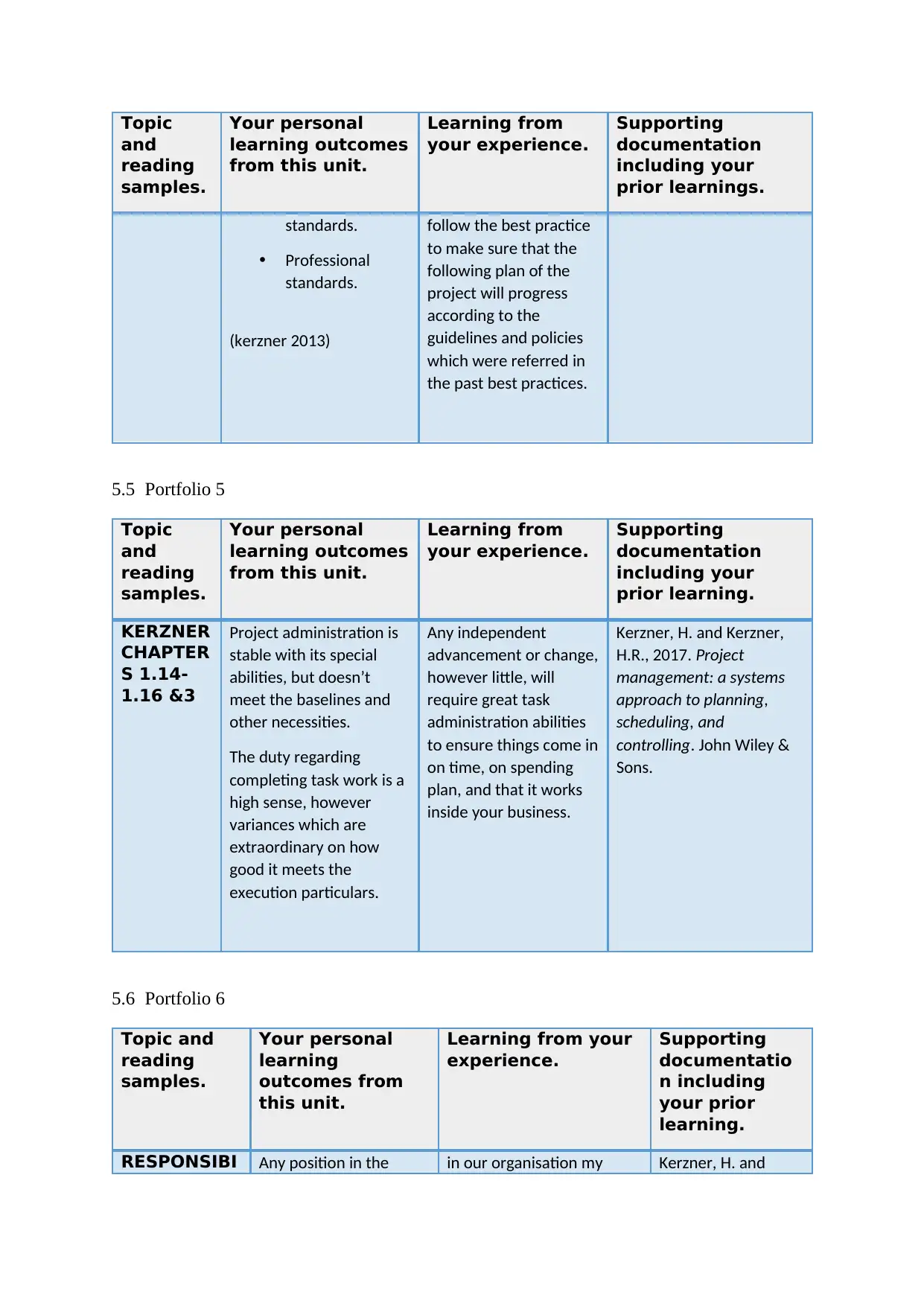
Topic
and
reading
samples.
Your personal
learning outcomes
from this unit.
Learning from
your experience.
Supporting
documentation
including your
prior learnings.
standards.
• Professional
standards.
(kerzner 2013)
follow the best practice
to make sure that the
following plan of the
project will progress
according to the
guidelines and policies
which were referred in
the past best practices.
5.5 Portfolio 5
Topic
and
reading
samples.
Your personal
learning outcomes
from this unit.
Learning from
your experience.
Supporting
documentation
including your
prior learning.
KERZNER
CHAPTER
S 1.14-
1.16 &3
Project administration is
stable with its special
abilities, but doesn’t
meet the baselines and
other necessities.
The duty regarding
completing task work is a
high sense, however
variances which are
extraordinary on how
good it meets the
execution particulars.
Any independent
advancement or change,
however little, will
require great task
administration abilities
to ensure things come in
on time, on spending
plan, and that it works
inside your business.
Kerzner, H. and Kerzner,
H.R., 2017. Project
management: a systems
approach to planning,
scheduling, and
controlling. John Wiley &
Sons.
5.6 Portfolio 6
Topic and
reading
samples.
Your personal
learning
outcomes from
this unit.
Learning from your
experience.
Supporting
documentatio
n including
your prior
learning.
RESPONSIBI Any position in the in our organisation my Kerzner, H. and
and
reading
samples.
Your personal
learning outcomes
from this unit.
Learning from
your experience.
Supporting
documentation
including your
prior learnings.
standards.
• Professional
standards.
(kerzner 2013)
follow the best practice
to make sure that the
following plan of the
project will progress
according to the
guidelines and policies
which were referred in
the past best practices.
5.5 Portfolio 5
Topic
and
reading
samples.
Your personal
learning outcomes
from this unit.
Learning from
your experience.
Supporting
documentation
including your
prior learning.
KERZNER
CHAPTER
S 1.14-
1.16 &3
Project administration is
stable with its special
abilities, but doesn’t
meet the baselines and
other necessities.
The duty regarding
completing task work is a
high sense, however
variances which are
extraordinary on how
good it meets the
execution particulars.
Any independent
advancement or change,
however little, will
require great task
administration abilities
to ensure things come in
on time, on spending
plan, and that it works
inside your business.
Kerzner, H. and Kerzner,
H.R., 2017. Project
management: a systems
approach to planning,
scheduling, and
controlling. John Wiley &
Sons.
5.6 Portfolio 6
Topic and
reading
samples.
Your personal
learning
outcomes from
this unit.
Learning from your
experience.
Supporting
documentatio
n including
your prior
learning.
RESPONSIBI Any position in the in our organisation my Kerzner, H. and
Paraphrase This Document
Need a fresh take? Get an instant paraphrase of this document with our AI Paraphraser
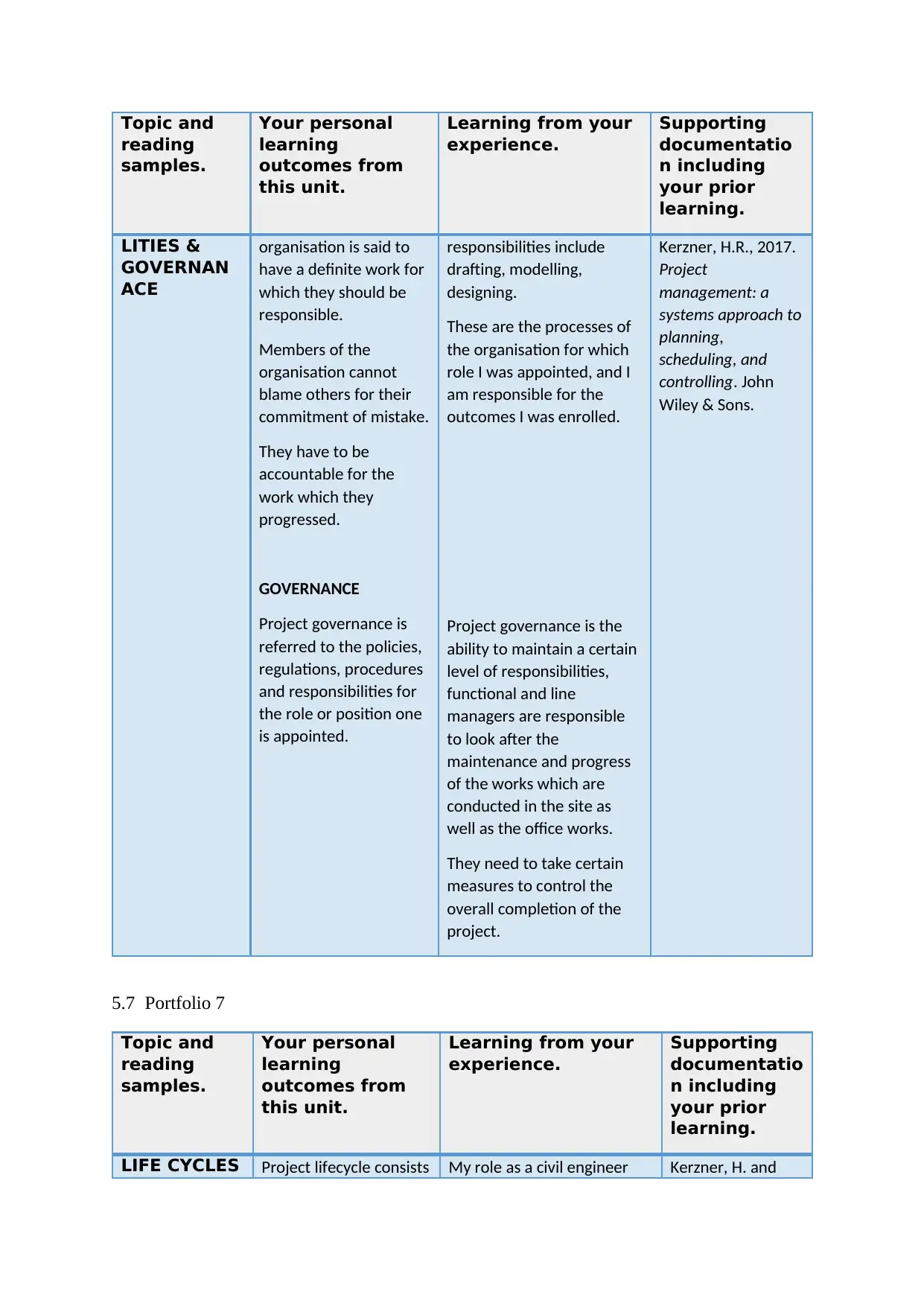
Topic and
reading
samples.
Your personal
learning
outcomes from
this unit.
Learning from your
experience.
Supporting
documentatio
n including
your prior
learning.
LITIES &
GOVERNAN
ACE
organisation is said to
have a definite work for
which they should be
responsible.
Members of the
organisation cannot
blame others for their
commitment of mistake.
They have to be
accountable for the
work which they
progressed.
GOVERNANCE
Project governance is
referred to the policies,
regulations, procedures
and responsibilities for
the role or position one
is appointed.
responsibilities include
drafting, modelling,
designing.
These are the processes of
the organisation for which
role I was appointed, and I
am responsible for the
outcomes I was enrolled.
Project governance is the
ability to maintain a certain
level of responsibilities,
functional and line
managers are responsible
to look after the
maintenance and progress
of the works which are
conducted in the site as
well as the office works.
They need to take certain
measures to control the
overall completion of the
project.
Kerzner, H.R., 2017.
Project
management: a
systems approach to
planning,
scheduling, and
controlling. John
Wiley & Sons.
5.7 Portfolio 7
Topic and
reading
samples.
Your personal
learning
outcomes from
this unit.
Learning from your
experience.
Supporting
documentatio
n including
your prior
learning.
LIFE CYCLES Project lifecycle consists My role as a civil engineer Kerzner, H. and
reading
samples.
Your personal
learning
outcomes from
this unit.
Learning from your
experience.
Supporting
documentatio
n including
your prior
learning.
LITIES &
GOVERNAN
ACE
organisation is said to
have a definite work for
which they should be
responsible.
Members of the
organisation cannot
blame others for their
commitment of mistake.
They have to be
accountable for the
work which they
progressed.
GOVERNANCE
Project governance is
referred to the policies,
regulations, procedures
and responsibilities for
the role or position one
is appointed.
responsibilities include
drafting, modelling,
designing.
These are the processes of
the organisation for which
role I was appointed, and I
am responsible for the
outcomes I was enrolled.
Project governance is the
ability to maintain a certain
level of responsibilities,
functional and line
managers are responsible
to look after the
maintenance and progress
of the works which are
conducted in the site as
well as the office works.
They need to take certain
measures to control the
overall completion of the
project.
Kerzner, H.R., 2017.
Project
management: a
systems approach to
planning,
scheduling, and
controlling. John
Wiley & Sons.
5.7 Portfolio 7
Topic and
reading
samples.
Your personal
learning
outcomes from
this unit.
Learning from your
experience.
Supporting
documentatio
n including
your prior
learning.
LIFE CYCLES Project lifecycle consists My role as a civil engineer Kerzner, H. and
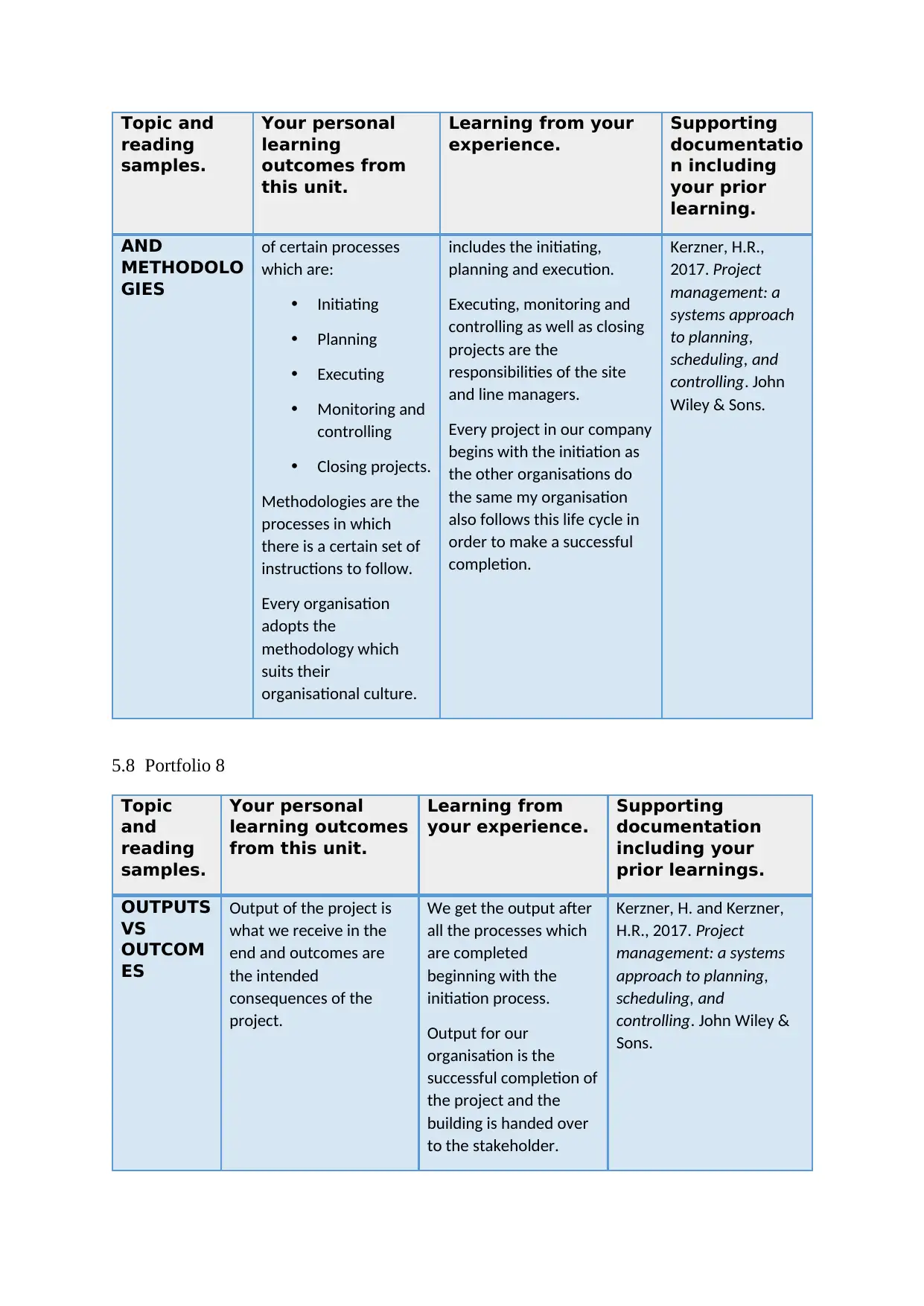
Topic and
reading
samples.
Your personal
learning
outcomes from
this unit.
Learning from your
experience.
Supporting
documentatio
n including
your prior
learning.
AND
METHODOLO
GIES
of certain processes
which are:
• Initiating
• Planning
• Executing
• Monitoring and
controlling
• Closing projects.
Methodologies are the
processes in which
there is a certain set of
instructions to follow.
Every organisation
adopts the
methodology which
suits their
organisational culture.
includes the initiating,
planning and execution.
Executing, monitoring and
controlling as well as closing
projects are the
responsibilities of the site
and line managers.
Every project in our company
begins with the initiation as
the other organisations do
the same my organisation
also follows this life cycle in
order to make a successful
completion.
Kerzner, H.R.,
2017. Project
management: a
systems approach
to planning,
scheduling, and
controlling. John
Wiley & Sons.
5.8 Portfolio 8
Topic
and
reading
samples.
Your personal
learning outcomes
from this unit.
Learning from
your experience.
Supporting
documentation
including your
prior learnings.
OUTPUTS
VS
OUTCOM
ES
Output of the project is
what we receive in the
end and outcomes are
the intended
consequences of the
project.
We get the output after
all the processes which
are completed
beginning with the
initiation process.
Output for our
organisation is the
successful completion of
the project and the
building is handed over
to the stakeholder.
Kerzner, H. and Kerzner,
H.R., 2017. Project
management: a systems
approach to planning,
scheduling, and
controlling. John Wiley &
Sons.
reading
samples.
Your personal
learning
outcomes from
this unit.
Learning from your
experience.
Supporting
documentatio
n including
your prior
learning.
AND
METHODOLO
GIES
of certain processes
which are:
• Initiating
• Planning
• Executing
• Monitoring and
controlling
• Closing projects.
Methodologies are the
processes in which
there is a certain set of
instructions to follow.
Every organisation
adopts the
methodology which
suits their
organisational culture.
includes the initiating,
planning and execution.
Executing, monitoring and
controlling as well as closing
projects are the
responsibilities of the site
and line managers.
Every project in our company
begins with the initiation as
the other organisations do
the same my organisation
also follows this life cycle in
order to make a successful
completion.
Kerzner, H.R.,
2017. Project
management: a
systems approach
to planning,
scheduling, and
controlling. John
Wiley & Sons.
5.8 Portfolio 8
Topic
and
reading
samples.
Your personal
learning outcomes
from this unit.
Learning from
your experience.
Supporting
documentation
including your
prior learnings.
OUTPUTS
VS
OUTCOM
ES
Output of the project is
what we receive in the
end and outcomes are
the intended
consequences of the
project.
We get the output after
all the processes which
are completed
beginning with the
initiation process.
Output for our
organisation is the
successful completion of
the project and the
building is handed over
to the stakeholder.
Kerzner, H. and Kerzner,
H.R., 2017. Project
management: a systems
approach to planning,
scheduling, and
controlling. John Wiley &
Sons.
⊘ This is a preview!⊘
Do you want full access?
Subscribe today to unlock all pages.

Trusted by 1+ million students worldwide
1 out of 15
Related Documents
Your All-in-One AI-Powered Toolkit for Academic Success.
+13062052269
info@desklib.com
Available 24*7 on WhatsApp / Email
![[object Object]](/_next/static/media/star-bottom.7253800d.svg)
Unlock your academic potential
Copyright © 2020–2026 A2Z Services. All Rights Reserved. Developed and managed by ZUCOL.




